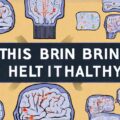The Profound Impact of Gratitude on the Brain
Gratitude is much more than just a positive emotion. A growing body of research on the neuroscience of gratitude reveals that regularly practicing gratitude fundamentally alters brain structure and function in ways that promote mental flourishing.
Gratitude Activates Reward Centers
Neuroimaging studies show that gratitude activates brain regions associated with reward processing including the striatum and ventral tegmental area. Feelings of gratitude flood the brain with dopamine, activating pleasure centers and leaving us feeling happy and calm.
Gratitude Reduces Stress and Anxiety
Studies demonstrate that gratitude practices such as keeping a gratitude journal or writing thank you notes to others decrease levels of stress hormones like cortisol while increasing relaxation-promoting neurotransmitters like serotonin. Less stress means better sleep, improved cardiovascular health, enhanced cognition and increased productivity.
Gratitude Strengthens Important Brain Regions
Regular gratitude practice increases gray matter volume and activity in brain regions involved in learning, memory and decision making like the posterior cingulate cortex and medial prefrontal cortex. Enhancing these areas allows for deeper reflection on positive life events and improves the ability to make complex choices that affirm one’s values and goals.
Gratitude Magnifies Experiences of Joy
MRI scans reveal that gratitude prompts enhanced activity in pleasure and social cognition pathways of the brain in response to positive news about others and uplifting life events. This boost in neural excitation amplifies the positive emotions elicited, helping good feelings linger.
FAQ
What part of the brain processes gratitude?
Key brain regions involved in gratitude include the prefrontal cortex, striatum, hypothalamus, and ventral tegmental area. These areas regulate executive function, reward processing, the stress response, motivation and positive emotions.
Does gratitude increase gray matter volume?
Yes, studies show that the regular practice of gratitude increases gray matter volume in regions like the posterior cingulate cortex and medial prefrontal cortex, which are involved in learning, memory and decision-making.
Can gratitude reduce anxiety?
Yes. Gratitude practices like maintaining gratitude journals and writing thank you notes have been shown to lower stress hormone levels and increase serotonin production, leading to decreased anxiety.
Does gratitude activate the brain’s reward system?
Gratitude prompts dopamine release in reward regions like the striatum and ventral tegmental area, generating feelings of pleasure and happiness reminiscent of being rewarded.
Can gratitude help treat depression?
Research indicates gratitude practices can reduce depressive symptoms and increase happiness by shifting one’s focus onto positive life events and blessings instead of negative ruminations.









